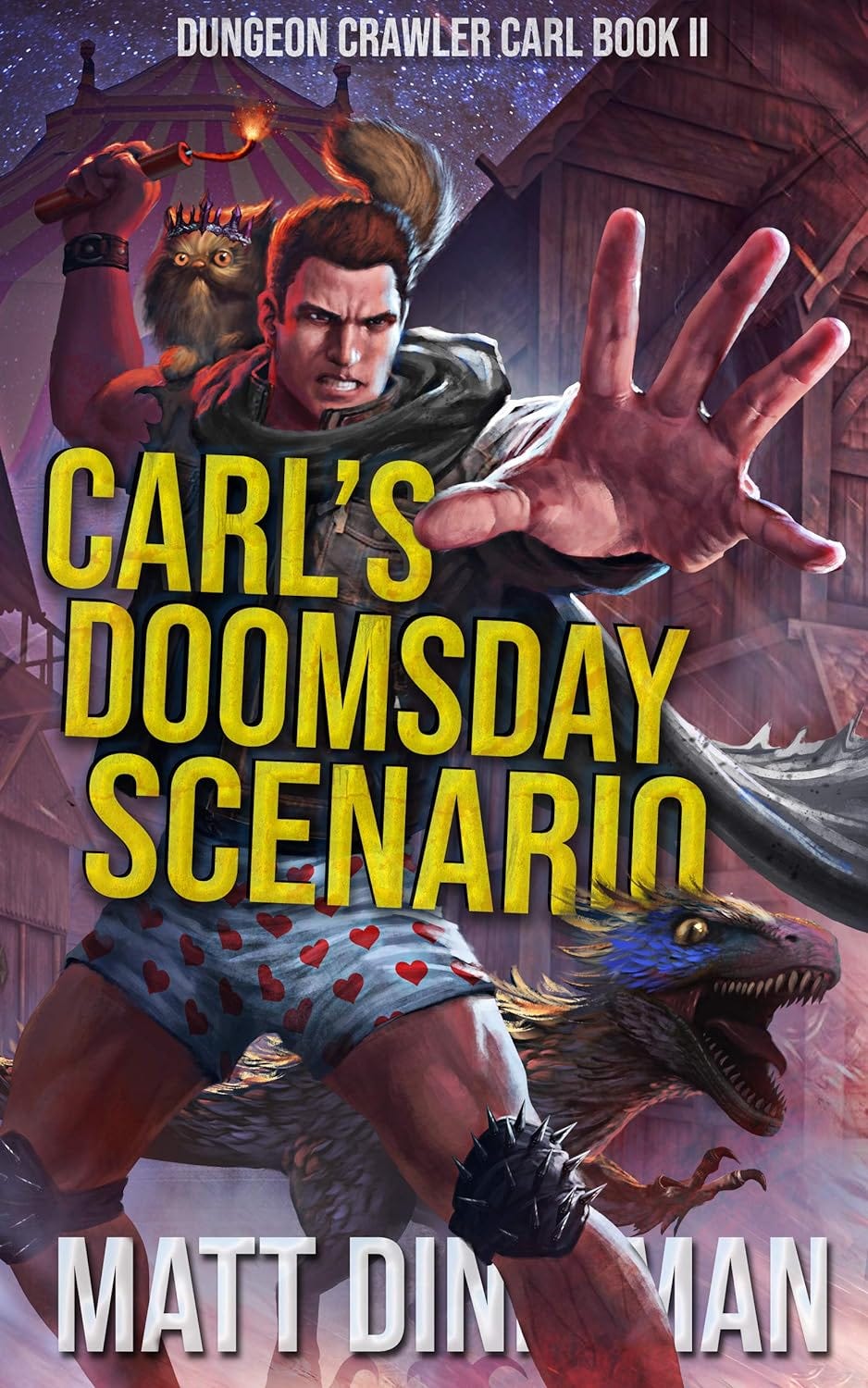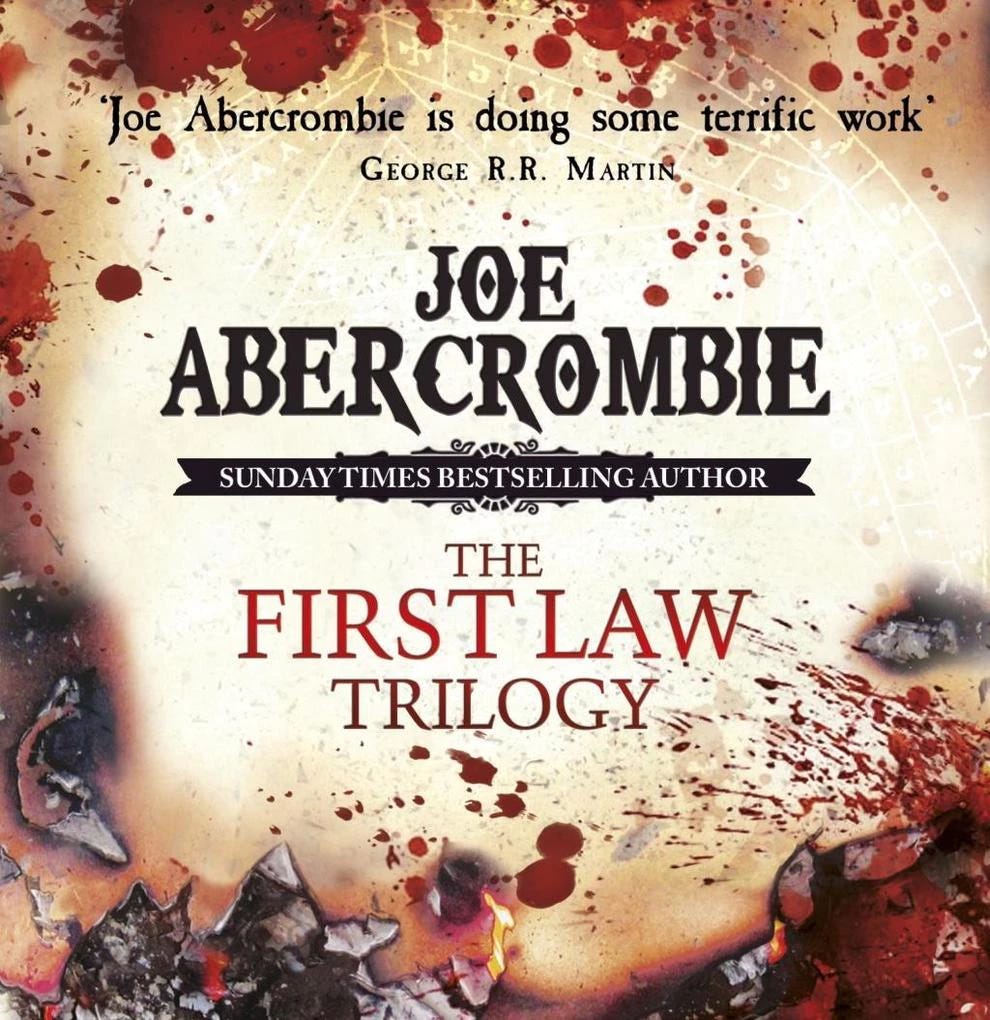Two Mondays ago, we launched a new podcast where we tackle epic fantasy series. We’re starting with Joe Abercrombie’s First Law! So hop along and join us as we discuss a series that really opened the floodgates to the grimdark genre.
The next episode just went up.
This is, in part, why I want to talk about a genre I’m describing as Masculine Fiction. I suppose you could consider it the inverse of what most people commonly knew as ChickLit.
I don’t think we use that term anymore and I wouldn’t want to use the term BroLit or something like that.
So what is Masculine Fiction? Well, to put it in its most simple terms, it’s a fiction about men and primarily written for a male audience. That’s not to say women aren’t in it or that women won’t read it. But the primary audience seems clear to me, or at least as clear as the intended audience for something like The Sisterhood of the Traveling Pants.
I bring all this up because Joe Abercrombie’s First Law series is undoubtedly Masculine Fiction. Just in the first novel, we’re introduced to dozens of characters across a continent but only two of them are women, and only one of them has a POV chapter. And to be honest, for all that Farro is certainly a woman, she is written with primarily masculine traits.
This is a problem I find with the portrayal of women across media. When you need a badass female character, people tend to write them exactly like they would write a man but with different pronouns. I’ve found this just as common in Romantasy as I have in Masculine Fiction, though most only seem to comment on it when the writer is a fella. But that’s not really what we’re here to talk about.
Last year, I read Bernard Cornwell’s Saxon Stories. Thirteen novels set in around the year 900 in England. Thirteen novels about badass dudes doing badass shit. Lots of violence and scheming and so on. Across the whole series, at least a million words, very little time is spent with women. Rather, almost every minute is about men. Men being men. Men together. Men against one another. Words of honor. Words of betrayal. Promises, oaths, friendship, fatherhood, apprenticeship. The rituals of masculinity, of becoming a man, of being a man, of raising men.
The series covers an entire life, from first memory to old age. And it captures that life fully, warts and all. And Uhtred, for all that his narrative voice intoxicates, is a real piece of shit. But he’s our piece of shit. He’s a piece of shit worth rooting for, worth following. He’s proud and vain and a terrible father, a terrible husband and lover, but he is a great warrior, a great leader of men.
And though none of us are killers or warriors, I think there’s a strange kind of camaraderie that we find in Uhtred and characters like him. We don’t want to be him, no. Or at least I hope not. But we find pieces of him to admire. Pieces of him that reflect ourselves, that show us how to be a man. Because I do think Masculine Fiction is a type of story intensely focused on this identity.
What is a man?
This same question arises when we consider a work like Berserk. Guts is, in many ways, a holy terror. We do not want to be him. We do not want to be like him.
And yet.
Sometimes we do.
While Uhtred and Guts and even Logen Ninefingers are not men to admire, there are aspects of them that shine so brightly that they inspire us. They inspire us to be better. To be great. To do what it takes to be a man, to become a man, to be a father, a son.
But what is a man?
Who can say? There are so many different answers. So many different kinds of answers. Yet we do live in a moment in time where masculinity is, I think, in true crisis. There are many factors here and this is a topic I’ll be exploring in various ways in future essays, but we’re also living in a moment where Masculine Fiction has been largely sidelined from the mainstream. Again, there are many reasons for that, but that topic is for a future essay as well.
And so where do young men go to find models for masculinity?
Well, sometimes to quite dark places.
Fortunately, Masculine Fiction is nothing new! In fact, it could be said that most fiction of the last few centuries falls under Masculine Fiction. And so we can find our models for manhood in the Three Muskateers or even stories like Robinhood and King Arthur. We can find them even in Bukowski’s degeneracy and Palahniuk’s or Bret Easton Ellis’ satire. It exists in so many places and from so many different times, that all you need to do is open up your eyes and look backwards.
But there is another place we see it burbling up, which is the selfpublished space.
I’ve been burning through the Dungeon Crawler Carl series, which I’d very much classify as Masculine Fiction. One interesting aspect to this story about an apocalyptic gladiator style game is how it presents Carl and his masculinity.
Carl is a hard man. He’s had a hard life. Despite that, and despite the brutal circumstances he finds himself in, he doesn’t give into despair or various behaviors that some have come to describe as toxic masculinity, but instead finds strength in building coalitions, in relying on friends, in sacrificing for those friends, for the people who rely upon him, who need him. And especially in his relationship with his cat, Princess Donut.
Consider this the beginning of an investigation into masculinity, but first join me and my good friend Joe Owens as we discuss Joe Abercrombie’s First Law series book by book.
Free novels:






I would be very, very fascinated to read your take on Dungeon Crawler Carl! I feel like most other forms of media are weirdly unable to portray video games in a way that's true to the experience of playing them, or even the experience of living in a world where they're a dominant and hyperprofitable form of entertainment that pretty much everyone under 30 has some experience with. (If you watched Anora you know what I mean!!) So I guess I'm curious what the deal with LitRPGs is, and if they're just a gimmick or what.
Meanwhile at the NYTimes:
The Vanishing White Male Writer by Jacob Savage.
By 2021, there was not one white male millennial on the “Notable Fiction” list. There were none again in 2022, and just one apiece in 2023 and 2024 (since 2021, just 2 of 72 millennials featured were white American men). There were no white male millennials featured in Vulture’s 2024 year-end fiction list, none in Vanity Fair’s, none in The Atlantic’s. Esquire, a magazine ostensibly geared towards male millennials, has featured 53 millennial fiction writers on its year-end book lists since 2020. Only one was a white American man.
https://www.compactmag.com/article/the-vanishing-white-male-writer/